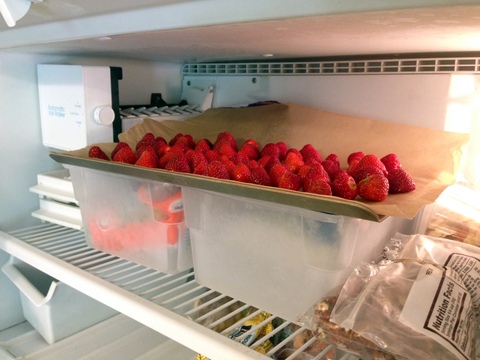

Mold spreads rapidly from strawberry to strawberry. Look for mold, fuzzy development, or mushiness. Plus, preserving strawberries gives you different snack and food options.īefore you preserve strawberries, make sure you take a close look at each berry. It takes extra steps to preserve them, but it’s better than letting them go to waste. If you can’t eat all of the strawberries immediately, preserving them lengthens their shelf life. A single lay also prevents mold from spreading from berry to berry. If possible, try to keep the berries in a single layer to prevent crushing or bruising. They should be stored whole with the stems and in a partially closed container lined with paper towels to absorb more water. It helps the berries keep moisture and not become dry and nasty. The best place to keep strawberries in the refrigerator is in the crisper drawer. Strawberries should only be washed in cold water and never soak strawberries they’ll absorb too much of the water. Some people think that you should wash them when you bring them inside, but the best-recommended practice is to wash berries when ready to eat them. Remove the strawberries from the containers as soon as you get them home if you don’t plan to eat them that day. Whether you buy berries at the store or harvest them in your garden, proper storing techniques extend the life of your strawberries.
#Freezing strawberries with junkit how to#
How to Store Fresh Strawberriesįresh strawberries last five to seven days in the refrigerator if stored properly. My go-to is making strawberry jam, but once I make enough jars of jam, I have to find other ways to use up the multiple quarts of strawberries our garden produces each year. I’m lucky if I manage to preserve any before the little hands eat them, but I love finding new ways to preserve strawberries when I do. Kids clamor to eat homegrown, fresh strawberries. Our family loves strawberries, especially our kids. You have to preserve strawberries within a week after harvesting, or they’ll start to mold and rot, even in your refrigerator. San Diego County Health officials have been tracking a small uptick in hep A cases since January, but a spokesperson said none are connected to the outbreak involving frozen strawberries.Strawberries are a quintessential summertime snack, but the fresh berries don’t last as long as other types of fruits. The FDA’s website has images of the bags of frozen strawberry included in the recall and details including specific expiration dates and lot numbers affected. Vaccines and post-infection treatments are available. Tseng says less than 10% of those infected with hep A will have symptoms, most cases resolve on their own, and young children generally have fewer symptoms from the virus. "If you see that, you’ve got to go to the doctor to get it tested out."
#Freezing strawberries with junkit plus#
"Sudden abdominal pain nausea, vomiting, diarrhea - then four days after that, you start to notice you’re urine gets really really dark, plus your stool gets really pale," Tseng said. He said if someone is exposed and becomes infected they might start seeing symptoms a few weeks later. Tseng said hep A commonly spreads through fecal matter. William Tseng, assistant chief of staff at Kaiser Permanente San Diego. The FDA said people should not eat the potentially contaminated berries and either return them or toss them out.

A food distributor in Oregon also recalled strawberries which were sent to Trader Joes and Aldi stores across California. Last month a federal investigation prompted Otay Mesa fruit distributor, California Splendor, to recall frozen organic strawberries from Costcos, including two business centers in Kearny Mesa and San Marcos. Los Angeles County health officials said Friday they identified a case linked to the outbreak.ĬDC investigators said the hepatitis A cases in California and Washington state are likely linked to frozen strawberries from farms in Baja California. A voluntary recall includes fruit sold at two San Diego County Costco business centers, Trader Joes and Aldi stores. Some of the potentially contaminated berries were sold in San Diego stores. Frozen strawberries linked to an outbreak of hepatitis A sickened at least seven people in California and Washington state.


 0 kommentar(er)
0 kommentar(er)
